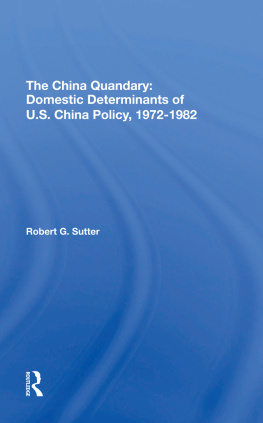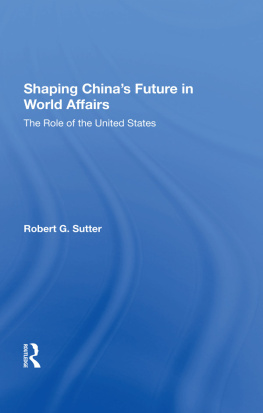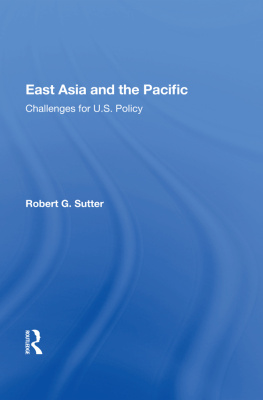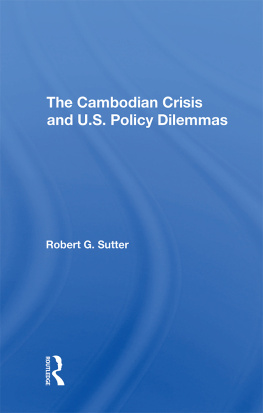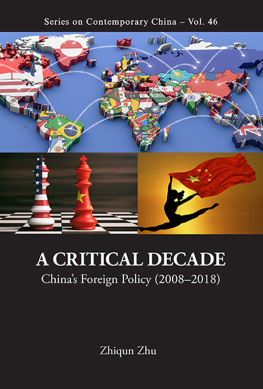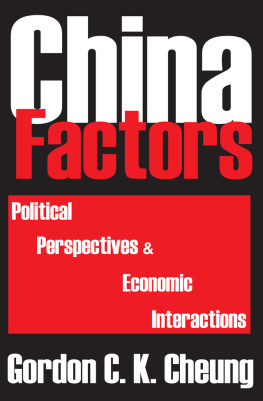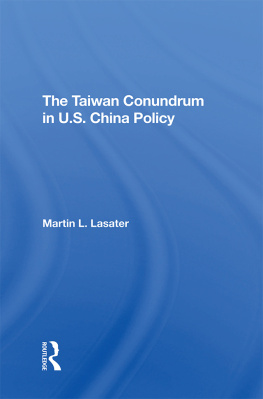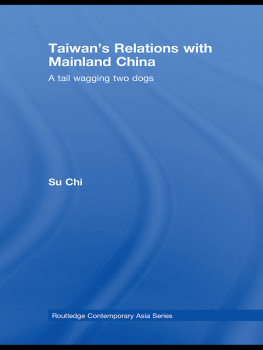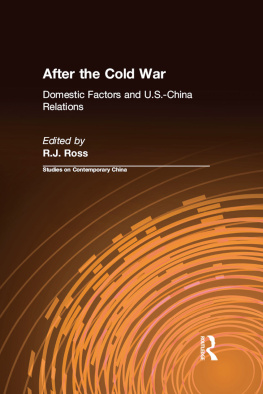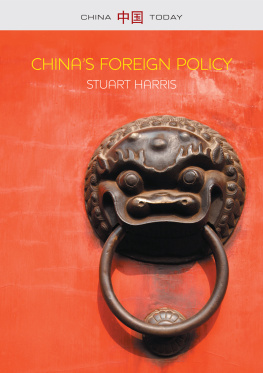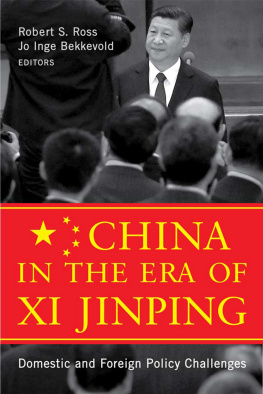The China Quandary: Domestic Determinants of U.S. China Policy, 1972-1982
Also of Interest
China Briefing, 1982, edited by Richard C. Bush
The Chinese Ministry of Foreign Affairs, 1968-1980: Revolutionary Politics vs . Continuity, Daniel Tretiak
China's Decision for Rapprochement with the United States, 1968-1971, John W. Garver
The Chinese Defense Establishment: Continuity and Change in the 1980s, edited by Paul Godwin
Current Economic Problems in China, Xue Muqiao
Economic Reform in the PRC: In Which China's Economists Make Known What Went Wrong, Why, and What Should Be Done About It, translated and edited by George C. Wang
China in World Affairs: The Foreign Policy of the PRC Since 1970, G.W. Choudhury
China's Economic Development, Chu-yuan Cheng
China: A Political History, 1917-1980, fully revised and updated edition, Richard C. Thornton
U.S. Foreign Policy and Asian-Pacific Security: A Transregional Approach, edited by William T, Tow and William R. Feeney
China Among the Nations of the Pacific, edited by Harrison Brown
China's Four Modernizations: The New Technological Revolution, edited by Richard Baum
China, the Soviet Union, and the West: Strategic and Political Dimensions for the 1980s, edited by Douglas T. Stuart and William T. Tow
Treaties of the People's Republic of China, 1949-1978: An Annotated Compilation, Grant F. Rhode and Reid E. Whitlock
Available in hardcover and paperback.
Westview Special Studies in International Relations
The China Quandary: Domestic Determinants of U.S. China Policy, 1972-1982
Robert G. Sutter
Although the United States has established formal diplomatic relations with the People's Republic of China (PRC), achieving major advances in economic and cultural relations, it continues to be bedeviled by serious dilemmas regarding such issues as future relations with Taiwan, U.S.-PRC military ties, the extent and type of U.S. aid to China, and the need for secrecy in U.S. China policy versus traditional American demands for "open" diplomacy. U.S. scholars have been clear about the international factors influencing current U.S.-PRC relations; however, the domestic political factors that have contributed in a major way to the creation of the dilemmas we face in formulating China policy today remain poorly understood.
This book concentrates on these domestic determinants of recent U.S. China policy. Pointing to the compromises and contradictions in policy choices made by leaders who have sharply differing conceptions of the goals of policy and their appropriate implementation, Dr. Sutter draws on a wide array of recent U.S. government publications and more than one hundred interviews with officials of the Carter and Reagan administrations and Congress to examine differences in views, divergencies in policy approaches, and the confusion that results. He specifically treats key issues such as the Taiwan Relations Act and possible U.S. arms sales to China, as well as summarizing and assessing domestic and foreign policy interests of the United States in relation to China and offering policy options for the problems that lie ahead.
Dr. Robert G. Sutter is a specialist in Asian affairs at the Congressional Research Service of the Library of Congress. He served as an analyst for the CIA in East Asian affairs from 1968 to 1977, specializing in Chinese foreign policy.
To my mother, Marie B. Sutter, and to the memory of my father, Leonard L. Sutter
First published 1983 by Westview Press
Published 2019 by Routledge
52 Vanderbilt Avenue, New York, NY 10017
2 Park Square, Milton Park, Abingdon, Oxon OX14 4RN
Routledge is an imprint of the Taylor & Francis Group, an informa business
Copyright 1983 by Taylor & Francis
All rights reserved. No part of this book may be reprinted or reproduced or utilised in any form or by any electronic, mechanical, or other means, now known or hereafter invented, including photocopying and recording, or in any information storage or retrieval system, without permission in writing from the publishers.
Notice:
Product or corporate names may be trademarks or registered trademarks, and are used only for identification and explanation without intent to infringe.
Library of Congress Cataloging in Publication Data
Sutter, Robert G.
The China quandary.
(Westview special studies in international relations)
Includes bibliographical references and index.
1. United StatesForeign relationsChina. 2. ChinaForeign relationsUnited
States. I. Title. II. Series.
E183.8.C5S878 1983 327.73051 82-23736
ISBN 13: 978-0-367-29078-8 (hbk)
The American reconciliation with the People's Republic of China (PRC) begun by President Richard Nixon and developed by succeeding U.S. presidents has enjoyed wide support in the United States as one of the most important breakthroughs in U.S. foreign policy since the cold war. In broad terms, each American administration, from Richard Nixon's to Ronald Reagan's, has sought to use better relations with China as a means to position the United States favorably in the U.S.-Soviet-PRC triangular relationship; to stabilize Asian affairs, secure a balance of forces in the region favorable to the United States and its allies and friends, and foster a peaceful and prosperous future for Taiwan; to build beneficial economic, cultural, and other bilateral ties; and to work more closely with the PRC on issues of global importance such as world food supply, population control, and arms limitations. China has supported the opening of relations with the United States as a means to strengthen China's national security against the Soviet threat and to oppose the expansion of Soviet power in Asian and world affairs; to obtain U.S. and other Western economic commodities, investment, and technology; and to benefit from cultural, educational, and tourist exchanges.
Despite this broad community of interests, however, Sino-American relations are often delicate and uncertain and need seemingly constant nurturing more than ten years after President Nixon and Chinese Communist Party Chairman Mao Zedong started the process of reconciliation during Nixon's landmark visit to China in 1972. In part, this has been caused by developments in the PRC and in international affairs beyond the control of the United States. But it has also been caused by contradictions and controversy in the United States that have adversely affected Sino-American relations.
This book is an examination of domestic determinants of American policy that have complicated U.S. efforts to develop close relations with China. It shows that divisions of opinion in the United States over Taiwan policy, U.S.-Soviet-PRC relations, U.S.-PRC economic relations, and the management of U.S. China policy have threatened at times to upset the ongoing Sino-American reconciliation.
Of course, these American domestic considerations have generally played a secondary role to the overriding U.S. interest in seeking advantage, especially strategic advantage, from the new relationship with China. During the period of U.S.-Soviet dtente in the first half of the 1970s, the United States sought to use improved relations with China to elicit positive Soviet foreign policy regarding U.S. interests and to use improved relations with Moscow to elicit positive Chinese foreign policy. U.S. planners tried to develop good relations with both communist countries, striving to have better relations with each of them than they have had with each other.

